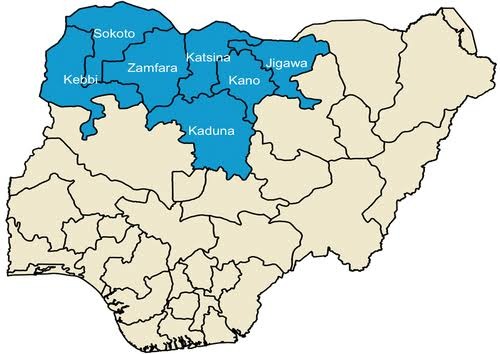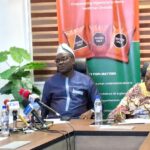
Fragility of Conflict-Affected Communities in North West Nigeria
By Chukwuma Okoli & Ndu Nwokolo
Nigeria’s North West region has gained notoriety for the increasing activities of different non-state armed groups (NSAGs) proliferating in the region. These NSAGs inflict violence on the communities and engage in various illicit economic activities, which fuel and fund violence across the North West and beyond. Nextier’s 2025 Security and Conflict Outlook report signposted the rise and expansion of various NSAGs across Nigeria, but particularly in the North West region of the country. For instance, the report identified Lakurawa as a new terrorist group operating and expanding in the border regions between Sokoto state of Nigeria and Niger, with the potential to worsen terrorism in the North West of Nigeria. Data from Nextier’s Nigeria violent conflict incidents showed that in the first half of 2025, attacks by Lakurawa alone resulted in 29 casualties in the North West, with Sokoto and Kebbi States being the affected states. On Friday, 11th July 2025, at least three police officers were reported to have been killed by members of the Lakurawa terrorist group in a battle between the police and the group. This depicts the growing lethality of the group.
The activities of Lakurawa as a new terrorist group in the North West coalesce with the sustained violence by bandits to worsen the fragility of communities in the North West region of Nigeria. The OECD defines fragility as “the combination of exposure to risk and insufficient coping capacity of the state, system and/or communities to manage, absorb or mitigate those risks.” It argues that fragility can engender negative outcomes such as violence, the breakdown of institutions, displacement, humanitarian crises or other emergencies. Communities in the North West manifest fragility across these dimensions, as evidenced by the humanitarian crises, poverty, and lack of security of lives and properties across communities in the region. Yet, this fragility is rooted in the political economy of the region, where the interests, incentives and power imbalance in the illicit mining economy expose the local communities to structural and physical violence while also diminishing their coping mechanisms. This edition of the Nextier SPD Policy Weekly provides a political economy analysis of the fragility of conflict-affected communities in North West Nigeria.
** Political Economy Analysis of Fragility in North West Nigeria
As aptly captured by Michael Reich, political economy analysis explains how power and resources are distributed and contested by different actors in society, as well as the consequential implications of such distribution and contestations for development. Thus, political economy analysis (PEA) highlights, inter alia, the interests, incentives, rent distribution, and historical legacies that undergird the contexts of different actors and how these factors impact development and security. The PEA provides an analytical framework for understanding factors and actors at the roots of the fragility in North West Nigeria. It underscores the incentives, interests and powers that sustain violence across various communities in the North West region.
The North West region of Nigeria is blessed with strategic minerals, including gold. The presence of these minerals has created a complex economy that brings together various actors, three of which are critical for understanding the political economy of fragility in the North West. These include the NSAGs, local elites (wealthy businessmen, politicians, and traditional rulers), and community members. Each of these actors has different interests/incentives, powers, and influences in the communities. For the NASGs, their incentive is the revenue they derive in the form of arms, drugs and food given to them by elites who claim ownership of minefields, in exchange for providing armed protection for minefields and illicit miners working for the elites. The NASGs reinvest the money they earn in procuring weapons for perpetrating violence and forcefully exercising territorial control (on behalf of their principals) over communities where these mineral resources are available. Access to arms and other instruments of violence makes the NSAGs powerful actors in communities where they operate. The second group of actors are the local elites, comprising wealthy businessmen, politicians, and traditional rulers in various communities in North West Nigeria. The incentives of the local elites are to retain control over the minefields, sustain illicit mining of mineral resources, and maintain the flow of revenue therefrom. These elites are influential and powerful by virtue of the political and/or traditional offices they occupy and the share of economic resources they control, with which they can procure violence to protect their interests. The third group of actors are community members. The community members find themselves helpless because of the inability of the government to contain the activities of the NSAGs and their collaborators (local elites). The core interest of the community members is to be allowed to go about their daily business, usually farming and artisanal mining, where and when possible. However, because they are powerless before the NSAGs and the local elites, they find themselves as victims of the criminal economy of illicit mining. To protect themselves, some community members provide tacit support to the NSAGs by joining them as recruits, thereby earning a living.
The high level of poverty in the North West may be a major factor which predisposes some community members to provide tacit support for the NSAGs. For instance, the 2022 report on multidimensional poverty in Nigeria, published by the National Bureau of Statistics (NBS), revealed that the North West region is home to the highest number of people who are multidimensionally poor in Nigeria. The region accounts for 34.2% or 45.49 million of the 132.92 million multidimensionally poor people in Nigeria. Explaining how poverty enables bandits to recruit young people, Governor Dikko Radda of Katsina State in the North West region remarked that bandits recruited young people for as little as N500. Aside from providing tacit support to NSAGs, some other community members seek protection from NSAGs by procuring the services of other armed groups for the protection of the communities. For instance, the Lakurawa were reported to have been invited by the communities around Gudu Local Government Area in Sokoto to protect them from the activities of Zamfarawa bandits. Unfortunately, the Lakurawa group grew out of control and is now involved in terrorising the region.
The political economy of fragility in the North West shows that the interests, incentives and power imbalance in the Illicit mining economy, particularly the transactional relationship between NSAGs and elites, as well as the contestations among the NSAGs and within the elites, expose communities to risks of sustained violence from various NSAGs. Moreover, community response to violence by NSAGs only creates a vicious cycle of violence by opening up the communities to more violence from new NSAGs, largely because the communities negotiate peace from a position of weakness due to low influence and power position in the political economy of the region. For instance, the formation of Yan Sakai vigilantes as a self-help mechanism by communities in the Northwest only polarised the communities and worsened the insecurity in the region by pitching the Hausa ethnic groups against the Fulanis. Similarly, as noted earlier, the invitation of Lakurawa to protect communities against bandits furthered the insecurity in the region as the group now terrorises the communities they were engaged to protect.
** Implications of fragility for security and development in the North West
The fragility of conflict-affected communities in the North West has serious implications for security and development in the region and beyond. First, the sustained activities of the NSAGs have continued to exacerbate the humanitarian crisis in the North West, resulting in further displacements, loss of livelihood, and weakened coping mechanisms among community members. The International Rescue Committee (IRC) reported that throughout March and April 2024, at least 10,000 people were displaced by armed attacks in the North West states of Zamfara and Sokoto.
Aside from economic losses, the civilian communities have sometimes found themselves in crossfire between the NSAGs and the Nigerian security forces. In January 2025, one military airstrike accidentally killed at least 16 members of one local vigilante group and farmers in Tungar Kara town in north-western Zamfara state. Similarly, in May 2025, at least 20 members of a group of local vigilantes pursuing a gang of bandits were mistakenly bombed by a Nigerian military jet in Zamfara. The continuous accidental bombing of local vigilantes by the military further weakens the local security architecture of the communities and the capacity of community members to cope or mitigate the threats to lives and properties posed by NSAGs.
** Recommendations
i. Strengthen implementation of Nigeria’s mineral and mining regulations: The Nigerian government should build the capacity of institutions saddled with implementing the mineral and mining regulations as provided in the Minerals and Mining Act of 2007, as well as the Minerals and Mining Regulations of 2011. Effective implementation of these regulations will reduce the illicit acquisition and operation of mining fields by local elites and illicit miners.
ii. Support community local security architecture: The state governments in North Western states should support local communities in establishing and operating local security architectures like vigilantes, which will support other state security agencies in the areas of intelligence gathering and sting operations against bandits.
iii. Enhance precision of military airstrikes: While the Nigerian military should sustain kinetic operations against the bandits, there is a need to enhance the precision of military airstrikes through enhanced intelligence gathering, regular capacity building for military personnel involved in airstrikes, and regular upgrade of military equipment used for air operations.
iv. Enhance coordination between the security agencies, communities and humanitarian agencies: There is a need to strengthen coordination between the security agencies, local communities and humanitarian agencies in order to ensure that humanitarian aids reach the hard-to-reach areas impacted by conflict in North West Nigeria.
** Conclusion
The sustained activities of NSAGs in the North West have continued to worsen the fragility of the region. Yet, the emergence, proliferation and activities of these NSAGs are rooted in the political economy of the region, where the interests, incentives and power imbalance in the illicit mining economy expose the local communities to structural and physical violence while also diminishing their coping mechanisms. The transactional relationship between NSAGs and elites, as well as the contestations among the NSAGs and within the elites, expose communities to sustained violence from various NSAGs and also weaken their coping capacity. The Nigerian government should, among others, strengthen the implementation of Nigeria’s mineral and mining regulations, support community local security architecture and enhance multi-stakeholder coordination to address the roots of banditry and fragility in North West Nigeria.
(Dr. Chukwuma Okoli is an Associate Consultant at Nextier and a Lecturer at the Political Science Department at Nnamdi Azikiwe University, Awka, Nigeria; while Dr. Ndu Nwokolo is a Managing Partner at Nextier and an Honorary Fellow at the School of Government at the University of Birmingham, UK)
















